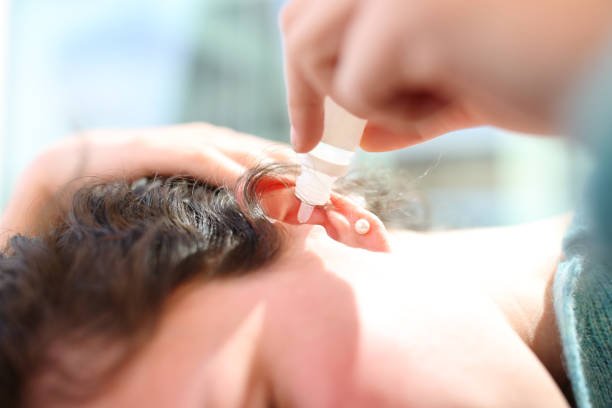Hydrogen Peroxide Ear Drops - An Audiologist's Take
When your ear starts feeling blocked up it is easy to turn to over the counter ear wax drops as a solution. A common ingredient found in these drops in Hydrogen Peroxide; a chemical many of us will have in our homes for cleaning surfaces or bleaching hair.
But what is it? And is Hydrogen Peroxide really a safe to use in our ears? Are there any risks involved?
For the answers to these questions and more read our guide.
What is Hydrogen Peroxide?
Hydrogen peroxide is a chemical compound with the formula H2O2, which French chemist Louis Jacques Thenard discovered in 1818 and originally named ‘oxygenated water’.
Today, it is known as Hydrogen Peroxide, as oxygenated water (H20) is simply water with additional oxygen dissolved in it and is safe to drink. Whereas Hydrogen Peroxide is a chemical compound which means the oxygen and hydrogen molecules are chemically bonded together and is not safe to consume.
Hydrogen Peroxide was first used commercially in the 1800s to bleach hats and later to restore old paintings by removing sulfur compounds from their surfaces. Nowadays, it has various applications as a bleaching agent, a disinfectant, an oxidizer, and an antiseptic. Its many uses range from rocket fuel and industrial cleaning to more household uses such as: wound cleaning, teeth whitening, and hair bleaching.
It is also a common ingredient found in over the counter liquid ear drops known as cerumenolytics.
How does Hydrogen Peroxide work on earwax?
Earwax is a natural substance produced by glands in the ear to protect the ear canal from irritants, water, and infection. However sometimes it is over-produced or hardens to create a blockage – in turn this can cause unwelcome side effects such as hearing loss, tinnitus, and muffled hearing.
Hydrogen Peroxide acts as an agent to soften and dissolve the blockage. It does this by adding oxygen to the wax causing it to bubble and break down, a process known as oxidation, which in turn makes it easier for it to drain out of the ear canal. This process can take several days of being applied 3 times a day to work.
However, Hydrogen Peroxide does not always work for earwax removal, sometimes the earwax may be too hard or too deep in the ear canal to be dissolved or it can cause adverse side effects. You should always consult with a doctor before administering Hydrogen Peroxide into your ear. Other methods of earwax removal are safer, faster, and more effective with microsuction being the most preferred by professionals.
Microsuction is a procedure performed by a specialist that involves using a small suction tube and probe to gently remove any excess ear wax in the ear canal. It is one of the safest and most painless ways to remove earwax as it does not involve putting any potentially harmful chemicals in your ear. In most cases it provides instant relief to any hearing loss or discomfort caused by the blockage, so you do not have to wait many days for relief or have repeated treatments.
Is Hydrogen Peroxide safe for my ears?
In short, no. Hydrogen Peroxide is a chemical that can cause irritation, inflammation, and potentially damage the eardrum and ear-canal if not administered correctly, or if administered when an ear infection, perforated eardrum, or allergy is present.
What risks are associated with cleaning your ears using hydrogen Peroxide?
Using Hydrogen Peroxide containing drops for earwax softening can have several negative consequences if overused or used when an ear infection is present.
As Hydrogen Peroxide can kill beneficial bacteria within the ear canal, it can create an environment in which harmful bacteria can grow, causing infections such as otitis externa (swimmer’s ear) or otitis media (middle ear infection).
It can also cause irritation within the ear, as it dries out the ear canal, which could lead to increased sensitivity, cracking, and bleeding. In more extreme cases, or if a Hydrogen Peroxide allergy is present, it can cause contact dermatitis or trigger an allergic reaction, resulting in hives, blisters, pain, or a rash, which in many cases will require medical intervention.
Additionally, Hydrogen Peroxide can be very harsh on the eardrum, especially if used when the eardrum is perforated. It can cause inflammation, pain, bleeding, or rupture of the eardrum, which can result in permanent hearing loss.
Summary
Hydrogen Peroxide containing over the counter earwax drops are not always a safe or effective method for earwax removal. They have the potential to cause inflammation, irritation, and infection to your ears when overused, used with ear infections, or used incorrectly.
Microsuction is the preferred treatment by specialist for earwax removal. Not only is it quicker, safer, and more effective, it does not use water or chemicals within the ear. Microsuction can prevent ear problems, protect your hearing, and improve your overall ear health. Microsuction is always performed by a professional, so you do not have to worry about the potentially harmful side effects associated with improper use of earwax drops containing Hydrogen Peroxide.
You can rest assured that your treatment will be safe and comfortable.
At Ear View we offer a range of safe and effective treatments for patients seeking earwax removal in the Suffolk area, performed by experienced audiologists. See a list of our locations and services or contact us for a consultation.


